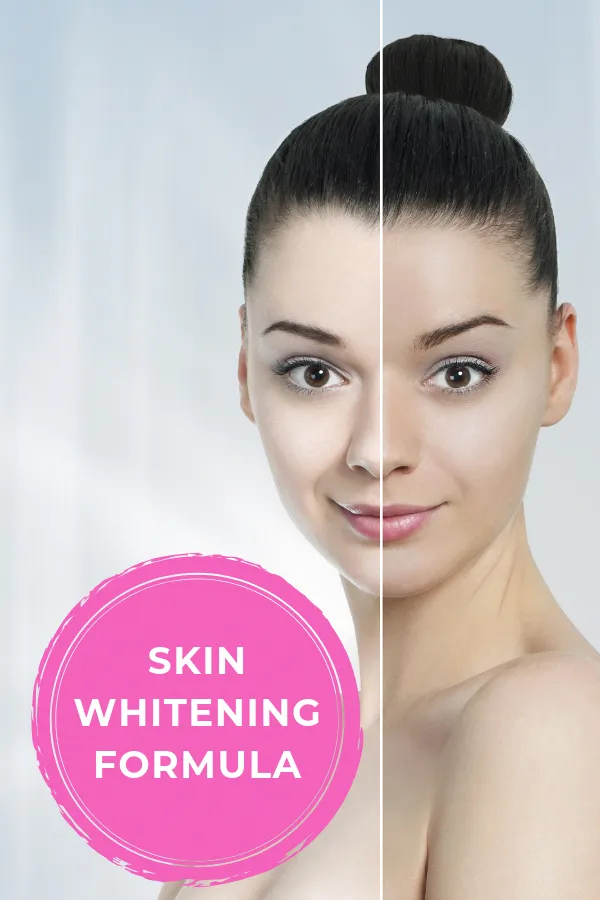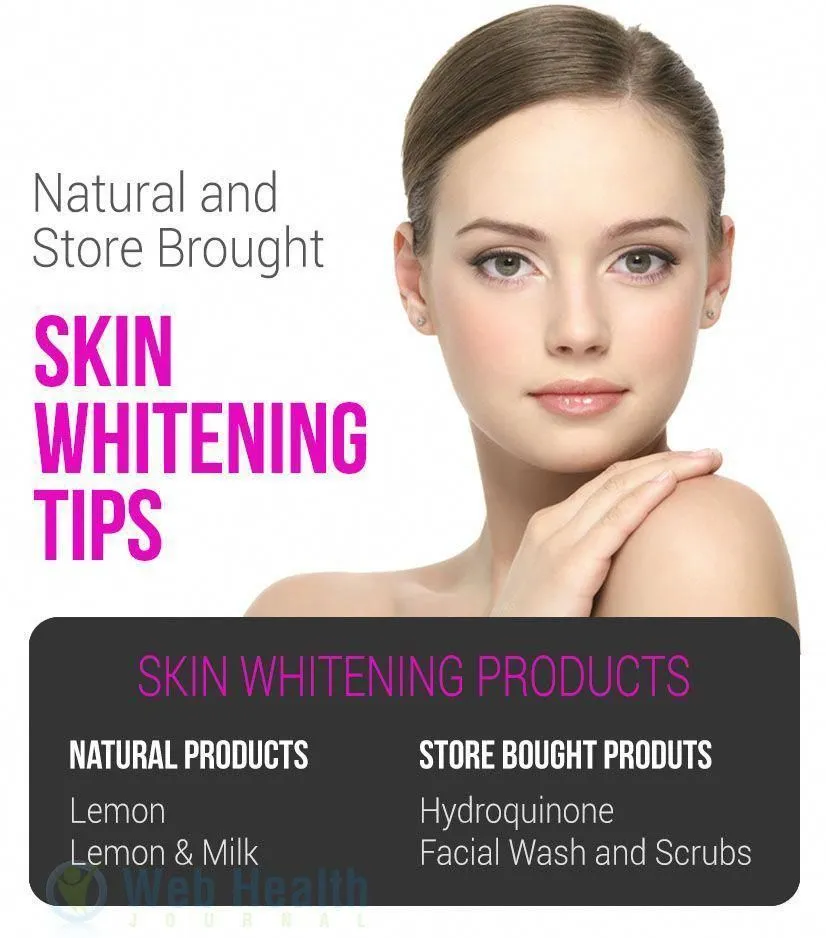What is Skin Whitening
Skin whitening, also known as skin lightening or skin bleaching, is a cosmetic procedure that aims to reduce the melanin pigment in the skin, thereby making the skin appear lighter. Melanin is produced by melanocytes, specialized cells in the skin, and its production is influenced by genetics, sun exposure, and hormonal factors. Skin whitening can be achieved through various methods, including the use of creams, serums, pills, and professional treatments. The popularity of skin whitening varies across different cultures, driven by diverse factors such as beauty standards, social pressures, and personal preferences. It’s crucial to understand that skin whitening products and procedures come with potential risks, and it’s essential to consult with a dermatologist before starting any treatment.
How Skin Whitening Works
Skin whitening works by interfering with the production of melanin. Different products and procedures employ various mechanisms to achieve this. Some ingredients, like hydroquinone, tyrosinase inhibitors, which are enzymes that play a crucial role in melanin production. Others, like retinoids, promote skin cell turnover, which helps to remove pigmented skin cells. Chemical peels and laser treatments target melanin directly, breaking down the pigment or reducing its concentration. The effectiveness of skin whitening treatments depends on several factors, including the concentration of active ingredients, the skin type, the underlying cause of pigmentation, and adherence to the treatment regimen. It’s important to be patient, as results may take weeks or months to become visible.
Skin Whitening Products

A wide array of skin whitening products are available, each with different formulations and active ingredients. It is essential to carefully research the product and, if possible, consult a dermatologist before use. The effectiveness and safety of these products can vary significantly. Some products may contain harsh chemicals that can cause skin irritation, while others may be ineffective. The use of over-the-counter products should be approached with caution, and a patch test should always be performed before widespread application. Products should be chosen based on skin type, the specific skin concerns, and the desired outcome. Always check the product’s ingredients to avoid any potential allergens and unwanted side effects.
Types of Skin Whitening Products
Skin whitening products come in various forms, including creams, serums, and pills. Creams are the most common type and are typically applied topically to the skin. Serums often contain a higher concentration of active ingredients and are designed to penetrate the skin more deeply. Skin whitening pills are taken orally and may contain ingredients that affect melanin production throughout the body. Each type of product has its own advantages and disadvantages. The choice of product type depends on individual preferences, the specific skin concerns, and the advice of a healthcare professional. Combination therapies, such as using a cream and serum, may be more effective than using a single product.
Skin Whitening Creams
Skin whitening creams are a popular choice for those seeking to lighten their skin. They typically contain ingredients like hydroquinone, kojic acid, arbutin, and vitamin C. Hydroquinone is a potent skin-lightening agent that inhibits melanin production, but it can also cause side effects like skin irritation and ochronosis (a condition where the skin turns bluish-black). Kojic acid is a natural product derived from fungi and has antioxidant properties. Arbutin is a natural derivative of hydroquinone and is considered a gentler alternative. Vitamin C, a powerful antioxidant, can help to brighten the skin and protect it from damage caused by free radicals. When selecting a cream, it is important to consider its concentration and any potential side effects. It is always advisable to perform a patch test before applying the cream to a larger area.
Skin Whitening Serums

Skin whitening serums offer a concentrated dose of active ingredients. They are often lighter in texture than creams, allowing for quicker absorption into the skin. Serums may contain ingredients like vitamin C, niacinamide, and alpha hydroxy acids (AHAs). Vitamin C, a powerful antioxidant, can help to brighten the skin and reduce the appearance of dark spots. Niacinamide, a form of vitamin B3, can help to improve skin tone and reduce inflammation. AHAs, such as glycolic acid and lactic acid, help to exfoliate the skin and remove dead skin cells, revealing brighter skin underneath. When selecting a serum, consider your skin type and the specific ingredients you are looking for. It is recommended to apply serum after cleansing and before moisturizing.
Skin Whitening Pills
Skin whitening pills are designed to lighten the skin from the inside out. They typically contain ingredients such as glutathione, vitamin C, and other antioxidants. Glutathione is a powerful antioxidant that plays a role in melanin production. Vitamin C can help to boost the effects of glutathione. The effectiveness and safety of skin whitening pills are often debated. Some pills may not have been thoroughly tested or regulated. It is crucial to research the ingredients and potential side effects before taking any skin whitening pills. It’s important to note that the use of skin whitening pills is not without risks, and they should not be considered a first-line treatment option.
Skin Whitening Procedures
In addition to products, various professional procedures can help to lighten the skin. These procedures are typically performed by dermatologists or trained skincare professionals. They can offer more dramatic results than over-the-counter products, but they also come with increased risks and costs. It is essential to research the procedure thoroughly, choose a qualified professional, and discuss the potential risks and benefits before undergoing any treatment. Follow-up care is often required to maintain the results and minimize any side effects. The choice of procedure depends on the individual’s skin type, the severity of the pigmentation, and the desired outcome.
Chemical Peels for Skin Whitening

Chemical peels involve applying a chemical solution to the skin to exfoliate the outer layers. This process can help to remove damaged skin cells and reveal brighter, more even-toned skin. Chemical peels vary in strength, from superficial peels that affect only the outermost layer of the skin to deep peels that penetrate deeper layers. The choice of peel depends on the individual’s skin type and the severity of the pigmentation. Common types of chemical peels used for skin whitening include glycolic acid peels, lactic acid peels, and trichloroacetic acid (TCA) peels. After a chemical peel, the skin may be red, sensitive, and prone to sun damage. Following post-peel care instructions, including avoiding sun exposure and using sunscreen, is crucial to protect the skin.
Laser Treatments for Skin Whitening
Laser treatments offer a targeted approach to skin whitening. Different types of lasers can be used to target melanin and break down the pigment. Laser treatments can effectively treat various pigmentation problems, such as sunspots, age spots, and melasma. Common laser treatments for skin whitening include Q-switched Nd-YAG lasers and fractional lasers. The number of sessions required depends on the individual’s skin type, the severity of the pigmentation, and the specific laser used. After laser treatment, the skin may be red, swollen, and sensitive. Protecting the skin from sun exposure is essential to prevent further pigmentation and maintain the results. Consult with a dermatologist to determine if laser treatments are appropriate for your skin type and concerns.
Microdermabrasion for Skin Whitening
Microdermabrasion is a minimally invasive procedure that exfoliates the skin using a device that sprays tiny crystals onto the skin. This process removes the outer layer of dead skin cells, revealing a smoother, brighter complexion. Microdermabrasion can help to improve the appearance of uneven skin tone, fine lines, and sun damage. The procedure is generally safe and well-tolerated, with minimal downtime. Multiple sessions are usually required to achieve noticeable results. After microdermabrasion, the skin may be slightly red and sensitive. Following post-treatment care instructions, including avoiding sun exposure and using sunscreen, is essential to protect the skin and maintain the results. Microdermabrasion can be a good option for those seeking a gentle, non-invasive skin whitening treatment.
Natural Skin Whitening Tips

In addition to products and procedures, some natural methods can help brighten the skin and promote a more even complexion. These methods often involve lifestyle changes and the use of natural ingredients. While natural methods may not produce dramatic results, they can be a safe and effective way to improve the skin’s appearance. It is essential to be patient and consistent, as results may take time to become visible. Always perform a patch test before using any natural ingredients on a larger area of the skin to check for allergic reactions. Natural methods can be a great complement to other skin whitening treatments, helping to enhance their effects and maintain results.
Exfoliation for Skin Whitening
Exfoliation involves removing dead skin cells from the surface of the skin. This process can help to reveal brighter, more even-toned skin. Exfoliation can be achieved through mechanical methods, such as using scrubs or exfoliating brushes, or chemical methods, such as using AHAs or BHAs (beta hydroxy acids). Mechanical exfoliation involves physically removing dead skin cells, while chemical exfoliation uses chemical agents to dissolve them. The frequency of exfoliation depends on the skin type and the method used. Over-exfoliation can lead to skin irritation and dryness, so it is essential to find the right balance. Exfoliation is a fundamental step in any skincare routine, as it helps to improve the absorption of skincare products.
Sun Protection for Skin Whitening
Sun protection is essential for maintaining a brighter complexion. Exposure to the sun’s UV rays can stimulate melanin production, leading to darker skin and uneven skin tone. Using sunscreen daily with an SPF of 30 or higher is crucial. Reapplying sunscreen every two hours, especially when outdoors, is recommended. Wearing protective clothing, such as hats and long sleeves, can provide additional protection from the sun. Avoiding peak sun hours (typically between 10 a.m. and 4 p.m.) can also help to minimize sun exposure. Sun protection is especially important if you are undergoing skin whitening treatments, as your skin may be more sensitive to the sun. Protecting your skin from sun damage is a critical step in achieving and maintaining a brighter complexion.
Healthy Diet for Skin Whitening

A healthy diet plays a significant role in skin health and can contribute to a brighter complexion. Eating a diet rich in fruits, vegetables, and antioxidants can help protect the skin from damage and promote a healthy glow. Antioxidants, such as vitamin C and vitamin E, can help to neutralize free radicals, which can contribute to skin aging and pigmentation. Incorporating foods like berries, citrus fruits, leafy greens, and nuts into your diet can provide essential nutrients for skin health. Staying hydrated by drinking plenty of water is also important for maintaining healthy skin. Avoiding processed foods, sugary drinks, and excessive alcohol can also benefit the skin. A balanced and nutritious diet supports overall health and contributes to a more radiant complexion.
Hydration for Skin Whitening
Staying hydrated is crucial for skin health and can contribute to a brighter complexion. Drinking plenty of water helps to keep the skin cells plump and hydrated, which can improve the skin’s texture and appearance. Dehydration can lead to dry, dull skin, making pigmentation more noticeable. Aiming for at least eight glasses of water a day is a good starting point, but the amount of water needed can vary depending on activity levels, climate, and individual needs. In addition to drinking water, consuming hydrating foods like fruits and vegetables can also help. Proper hydration supports overall skin health, including its ability to repair and regenerate. Maintaining adequate hydration can enhance the results of skin whitening treatments.
Things to Avoid During Skin Whitening
Certain habits and substances can hinder the skin whitening process and even worsen pigmentation. Avoiding excessive sun exposure is paramount, as UV rays stimulate melanin production. Using tanning beds is also detrimental. Smoking can damage the skin and accelerate aging. Avoiding harsh skincare products that can irritate the skin, such as those containing alcohol or fragrances, is also important. Certain medications can increase the skin’s sensitivity to the sun. Always consult a dermatologist or healthcare professional about any medications you are taking and how they might affect your skin. Avoiding these things will help optimize your skin-whitening efforts and protect your skin from further damage.
Potential Risks of Skin Whitening

Skin whitening treatments come with potential risks, and it’s essential to be aware of them before starting any procedure. Overuse of skin whitening products, especially those containing hydroquinone, can lead to skin irritation, ochronosis, and thinning of the skin. Chemical peels and laser treatments can cause side effects such as redness, swelling, scarring, and changes in skin pigmentation. Some skin whitening pills may contain harmful ingredients or have not been thoroughly tested. It’s crucial to choose reputable products and procedures and to consult with a qualified dermatologist or healthcare professional before starting any treatment. Understanding the potential risks will help you make informed decisions about your skincare routine.
Side Effects of Skin Whitening Products
Skin whitening products can cause various side effects, depending on the ingredients and the individual’s skin type. Common side effects include skin irritation, redness, dryness, and itching. Hydroquinone, a common ingredient in skin whitening creams, can cause ochronosis, a condition where the skin turns bluish-black. Some products may cause allergic reactions. Chemical peels and laser treatments can cause redness, swelling, and changes in skin pigmentation. It’s important to discontinue use of any product that causes adverse reactions and to consult with a dermatologist. Always perform a patch test before using a new product on a larger area of the skin to check for any potential allergies or adverse effects.
When to See a Dermatologist
It’s advisable to consult a dermatologist before starting any skin whitening treatment. A dermatologist can assess your skin type, identify the underlying cause of pigmentation, and recommend the most appropriate treatment options. If you experience any adverse reactions, such as severe irritation, burning, or changes in skin color, it’s important to see a dermatologist immediately. A dermatologist can help you manage the side effects, determine the appropriate course of action, and prevent further skin damage. Regular check-ups with a dermatologist can also help to monitor the progress of your skin whitening treatments and ensure that you are achieving the desired results safely.
Maintaining Your Brighter Complexion
Once you have achieved a brighter complexion, it’s important to take steps to maintain the results. Continuing to use sunscreen daily is essential to protect your skin from sun damage and prevent further pigmentation. Following a consistent skincare routine that includes gentle cleansing, moisturizing, and exfoliation can help to keep your skin healthy and radiant. Avoiding harsh skincare products and maintaining a healthy lifestyle can also help. Regular check-ups with a dermatologist can help you to monitor your skin’s condition and make any necessary adjustments to your skincare routine. Maintaining a brighter complexion requires a long-term commitment to skincare and a healthy lifestyle.
